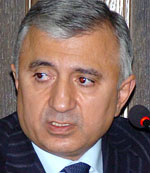– Mr. Danielyan, in its resolution 1677 the PACE urged the Armenian government to release all the people in search, who’d turn in by July 31. Nicol Pashinyan turned himself in but got arrested. Will MP Khachatur Sukiastyan face the same?
– It is not my authority to arrest or not arrest anyone and therefore I cannot answer this. Usually it is the court that decides whether the investigated person should be arrested or not after the investigators makes mediation on the arrest in the court. Therefore, it is not the power of the justice ministry. As a lawyer I cannot give my evaluation regarding any concrete case because no lawyer should make statements unless he is well aware of the details of the case. There are clear legislative requirements for the arrest, which are enacted in Article 5 of the Human Rights Convention, they originate and conform to the principles of the European Court. The resolution in this case doesn’t have such a power and cannot regulate those relations. In this case the fact of only showing up cannot deter the culprit from being arrested. All these facts must be examined and delivered by the body, which is in charge of the investigation.
– The Human Rights Watch Armen Harutyunyan stated that if the cases of the culprits of the aftermath of the tragic events of March 1 are investigated in the European Court of Human Rights then Armenia wouldn’t stand a chance. What do you think about this especially in the background of the fact that over 2 dozen of public activists are still in jail?
– First of all, I don’t have to comment on such statements even if they were heard in this context. The justice ministry is authorized to prepare attitudes and cases, which would match the standards of the European Court and send them out if needed. And if the court questions us on any matter we will answer those with most of seriousness. At this moment the fact of trying to persist and forecast the future of this or other case means making an attempt of substitution to the European Court. I am not going to personally embarrass any other structure by my statements, regardless of whether it is the European structures or the domestic ones.
– It was expected that as a result of the revision of Articles 225 and 300 of the Criminal Code all the detainees of the March 2008 case would be released. But it didn’t happen and the case reached the amnesty level and even during the latter only part of the prisoners was released.
– You are incorrectly presenting the situation and I don’t even blame you of that. You bring up only what’s been hailed for so long in the media. And perhaps we were mistaken for not denying this information on time, which wouldn’t confuse the society and they’d be more literately informed about the truth. The revision of the mentioned articles of the Criminal Code initiated by the NA, have had an immense criminal-legal consequences. And it’s wrong to say that the case reached the amnesty level. We may say that the amnesty has become an additional lever to revise the criminal responsibility of certain people during this period. If there were no changes in these articles then the amnesty wouldn’t cover them. If in the past they were sentenced based on the 3rd Clause of Article 225 then as a result of the legislative amendments they were charged based on the first Clause of the same article, which enabled the most part of them to be released from the court hall and the punishment of the rest was decreased.
– In one of the PACE resolutions there was a concern that some people were arrested by the testimonies of the police officers. Don’t you share their opinion that this fact may have had a political motivation? Even today three people Aram Bareghamyan, Ashot Manukyan and Mushegh Saghatelyan are in prison due to the testimonies of the policemen.
– It is quite abstract to say that these people are in jail based on only one testimony on part of a police officer. Somebody may be jailed even if there is no testimony. So in this case the important thing is not who made the testimony but how they affected the course of the case.
– Last week the health conditions of the editor of Zhamanak newspaper Arman Babajanyan drastically deteriorated. There are approximately two months left before his release from jail. Can the fact of his bad health state become a reason for his sooner release in order to enable him to be cured?
– The health state of any prisoner or detainee is in the center of our attention and the penitentiary does everything to provide relevant medical aid to these people. If need these people are sent to citizens’ hospitals for thorough examination. Only the conclusion of the examining doctor can decide whether the patient should receive medical help in prison or citizens’ hospital.

